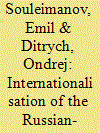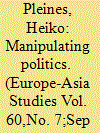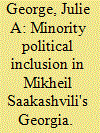|
|
|
Sort Order |
|
|
|
Items / Page
|
|
|
|
|
|
|
| Srl | Item |
| 1 |
ID:
084803


|
|
|
|
|
| Publication |
2008.
|
| Summary/Abstract |
The article provides a critical reading of various related discourses, depicting the political motives behind the conflict in Chechnya as a battlefield of the global jihad. These narratives have sought to present the involvement of external Islamist groups as a major factor in the conflict, and to portray many of the main groups within Chechnya as subscribing to a jihadist ideology. The authors suggest an alternative narrative focusing on the significance of the blood feud in the societies of the North Caucasus. It is argued that it is necessary to differentiate between the radicalisation of the resistance as such and the strengthening of the ideology of jihad. It is concluded that the resistance currently assumes a supranational character, yet one which is delimited regionally rather than globally.
|
|
|
|
|
|
|
|
|
|
|
|
|
|
|
|
| 2 |
ID:
084750


|
|
|
|
|
| Publication |
2008.
|
| Summary/Abstract |
This study investigates the forms and networks of civic activism on the Russian-language segment of the internet through the data of anti-military web pages and weblogs in 2007. The results of the web page analysis are complemented by interviews with Russian activists and discussed in the context of the role of the internet in Russian democratisation. Although the state of anti-military activism on the Russian internet currently seems fragmented, the role of the internet and one particular weblog platform, LiveJournal, are considered to contain important potential for future forms of Russian activism.
|
|
|
|
|
|
|
|
|
|
|
|
|
|
|
|
| 3 |
ID:
084755


|
|
|
|
|
| Publication |
2008.
|
| Summary/Abstract |
This article focuses on political aspects of Ukrainian privatisation auctions during the presidency of Leonid Kuchma. It contributes to a discussion of the role of big national investors, or so-called oligarchs, in the context of a regime of competitive authoritarianism in Ukraine. A quantitative evaluation is made by means of an assessment of the values of the winning bids in the privatisation auctions under Kuchma and this is linked to a characterisation of the successful bidders in terms of their links to oligarchical networks. As a result distinct strategies of the Yushchenko and the Yanukovych governments towards auctions and towards oligarchs in general can be identified.
|
|
|
|
|
|
|
|
|
|
|
|
|
|
|
|
| 4 |
ID:
084752


|
|
|
|
|
| Publication |
2008.
|
| Summary/Abstract |
Georgia's Rose Revolution promised sweeping economic and political reforms, designed in part to enhance the livelihoods of ethnic and religious minority populations. The Rose events, however, occurred concomitantly with a surge in ethnic unrest. This article examines this paradox, arguing that the three major policy goals of the Saakashvili regime: the devolution of power to minorities, anti-corruption reform and state capacity building, have resulted in contradictory policy outcomes that have disproportionately hurt ethnic and religious minority enclaves.
* Thanks to APSA and ASN panel discussants Mark Beissinger and Stephen Jones and the two anonymous reviewers for their insightful comments. Many thanks to Alexander Rondeli and Temuri Yakobashvili at the Georgian Foundation for Strategic and International Studies in Tbilisi, as well as Eka Metreveli, Nana Papiashvili, Salome Tsereteli, Irakli Vacharadze, and Jeremy Teigen. Research was conducted with monetary support from the Fulbright Program and the Professional Staff Congress of the City University of New York. All errors are my own.
|
|
|
|
|
|
|
|
|
|
|
|
|
|
|
|
| 5 |
ID:
084807


|
|
|
|
|
| Publication |
2008.
|
| Summary/Abstract |
Cold War historiography, in many instances, explained the delimitation of borders in Central Asia as a part of Moscow's divide and rule policy in Turkestan. However, the viability of this approach can be challenged by an examination of the archival documents of the time and the actual publications of the nationalities commissariat under Stalin. Among the Bolsheviks of Turkestan, Uzbeks were leading the drive towards the repartition of Turkestan, along with their Turkmen comrades who were trying to gain land from the former Khivan Khanate, at that time the People's Soviet Republic of Khorezm. The partition of Khorezm between three newly created administrative divisions, Uzbekistan, Turkmenia and Kirgizia, played a key role in the demarcation of borders in 1924. However, from the point of view of communists from the European parts of the former Tsarist Empire, as well as others from the region, delimitation was first a betrayal of internationalism; second it was an immature project both economically and theoretically; and third, it was believed that the liquidation of the traditional Muslim states of Turkestan, namely the Bukharan Emirate and the Khivan Khanate, would have a negative impact on the image of the Soviet revolution in the eyes of reformers in other Muslim countries in the Middle East.
|
|
|
|
|
|
|
|
|
|
|
|
|
|
|
|
| 6 |
ID:
084805


|
|
|
|
|
| Publication |
2008.
|
| Summary/Abstract |
In 1929, when rationing was introduced widely across the Soviet Union, urban residents and housing organisations started to organise their own canteens at the residence level by collecting their ration books. These were called 'self-managed canteens' (samodeyatel'nye stolovye). Although this canteen project did not expand as expected during the food crisis of the early 1930s, the project was more successful in Moscow's Frunze raion. This was especially true of canteen No. 171, reportedly established at the initiative of housewives, which continued to operate until 1940 with a steady growth in gross sales, and which started to allocate part of its profits to local community activities. This unique case exemplifies a communitarian project by residents which might lead to a reconsideration of the 'public' under the Stalinist regime.
|
|
|
|
|
|
|
|
|
|
|
|
|
|
|
|
|
|
|
|
|